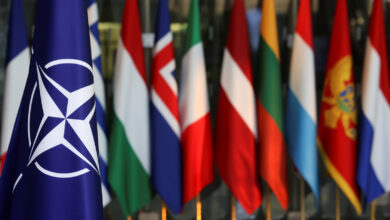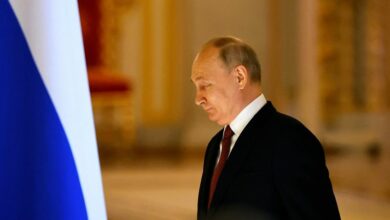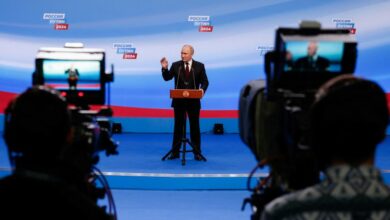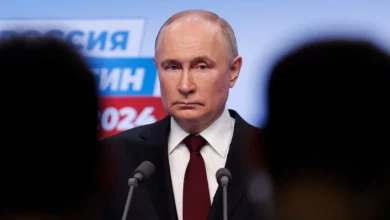Russian protest leader Alexei Navalny led thousands through the streets of Vladimir Putin's native city Saturday demonstrating against his likely return to the Kremlin in 4 March polls.
The demonstration was called a day before thousands more plan to link hands around Moscow in a symbolic show of frustration with the ex-KGB spy's decision to seek a third presidential term after dominating Russia for 12 years.
"The event on 4 March cannot be called an election," Navalny told reporters before heading to the central Moscow Station in Saint Petersburg for the protest.
"People should not be looking at it as an election but as an opportunity to create as much stress for the authorities as possible … by voting for anyone but Putin," Navalny said.
Thousands then snaked their way along the city's scenic embankments chanting "Russia without Putin" and "Putin is a thief" — a cry that would have been unimaginable just months ago — while police helicopters circled overhead.
"I do not want our president to be a thief. I do not want our president to be a coward," Navalny later shouted down from a rally stage to a screaming crowd that the local zaks.ru news agency estimated at 7,000.
The 35-year-old Navalny has gained prominence among Russia's Internet-savvy youth for waging a tireless web campaign to expose state corruption.
He is now one of the most recognised protest figures and drew some of the loudest cheers at a mass January rally in Moscow when he threatened to lead one million people in a march on Putin's government White House.
Navalny has also done little to hide aspirations to run for president one day.
"Every person involved in politics has political ambitions. My ambitions stretch as far as my voters can take me," Navalny said Saturday.
Police in both Saint Petersburg, Russia's former tsarist capital, and Moscow had refused to sanction such events for much of the past decade as Putin established a tight regime under which the state grabbed control of various aspects of society.
But that policy changed when angry protests began to shake major cities following 5 December parliamentary elections in which the ruling party managed to barely hang on to its majority of seats in a fraud-tainted poll.
The authorities' refusal to fully investigate many of the tampering claims and call a new parliamentary vote has forced the protest movement to channel its anger instead on Putin's planned return to the presidency for a six-year term.
Putin is being challenged by four marginal opposition figures who have been given little credit by the anti-Putin movement and are destined to lose by an overwhelming margin.
The latest polls and forecasts show Putin winning in the first round with around 10 percentage points fewer than the 71 percent he secured on his re-election to a second term in 2004.
"The state has obviously decided to declare Putin winner in the first round," said former chess champion and harsh Putin critic Garry Kasparov.
"It does not matter how much he really gets. The figure will turn out being around 60 percent," Kasparov said, sitting beside Navalny.
Putin served the maximum allowable two consecutive terms as president before handing over to his hand-picked successor Dmitry Medvedev, while continuing to call the shots as Russia's powerful prime minister for the past four years.
His announcement last year that he would be swapping jobs with Medvedev as if it were a foregone conclusion lit the fuse for the current explosion of anger.
The elections are already set to be followed by still more demonstrations both on the day after the vote and on 8 March, a public holiday for International Women's Day.
"If they falsify the vote again, we will come out for a decisive battle after March 4," said radical left leader Sergei Udaltsov.




